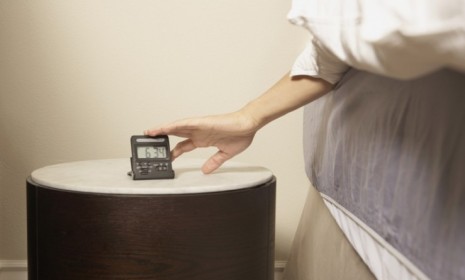Is daylight saving time 'useless'?
We're used to falling back in October and springing forward in March — but some argue that the biannual ritual does more harm than good

A free daily email with the biggest news stories of the day – and the best features from TheWeek.com
You are now subscribed
Your newsletter sign-up was successful
As we grudgingly set our clocks ahead this weekend, sacrificing a precious hour of sleep to the daylight saving gods, many of us likely had an identical thought: "Is this really necessary?" Daylight saving time (DST) is a decades-old tradition, but many suspect that it "does nothing more than create a nation of groggy and confused citizens," says Deanna Gillen at PolicyMic. Some particularly ticked-off Americans are even circulating an "End Daylight Saving Time" petition on the internet, claiming that DST offers few benefits and calling on lawmakers to end the madness. Here, a guide to DST and its controversies:
When did DST start?
Daylight saving was first introduced by European countries during World War I, with much of the U.S. joining the party in 1918. The idea was that more hours of daylight would "conserve coal for the war effort," says Brad Plumer at The Washington Post. Since then, energy conservation continues to be the central argument for keeping DST.
The Week
Escape your echo chamber. Get the facts behind the news, plus analysis from multiple perspectives.

Sign up for The Week's Free Newsletters
From our morning news briefing to a weekly Good News Newsletter, get the best of The Week delivered directly to your inbox.
From our morning news briefing to a weekly Good News Newsletter, get the best of The Week delivered directly to your inbox.
Does DST actually save energy?
It's pretty much "useless" in this respect, says Gillen. While more sunlight does encourage people to use less electrical lighting, they tend to crank up their air conditioners when they get home from work in the summer months, and run their ACs longer. When Indiana implemented DST in 2006, the state's electrical costs jumped by as much as $14.5 million per year.
So who supports DST?
Retailers are huge fans. With more people out and about in the late afternoon, many tend to go shopping. In fact, under pressure from big businesses, Congress in 2005 extended daylight savings by four weeks (we used to spring forward in April, not March). However, while DST is a boon for some sectors of the economy, its tendency to keep people on the town into the evenings hurts others. Television networks are bummed that fewer people are at home channel-surfing. Fox's most popular show, American Idol, "typically plunges in ratings the week after DST is initiated," says Sterling Wong at Minyanville.
A free daily email with the biggest news stories of the day – and the best features from TheWeek.com
Are there any physical side effects?
Yes, and they're not limited to sleepiness and general grouchiness. A sudden change to your daily schedule can cause inflammation, increasing the risk of a heart attack by 10 percent, according to a study from the University of Alabama. Altering your circadian rhythms, which are determined by light and darkness, can mess with your body at the level of cells, all of which are being jarred awake an hour earlier than usual. And one study shows that traffic accidents spike in the spring, when people are tired from springing forward, and subside in the autumn.
But don't people find more hours of sunshine pleasant?
It's all in the eye of the beholder. "It's great to get home and still have sunlight. But it's also great to wake up in the morning and see sunlight," John Lowe, the head of the National Institute of Standards and Technology, tells The Los Angeles Times. "I guess it depends on whether you are a morning person or an evening person."
Sources: The Daily Mail, The Los Angeles Times, Minyanville, PolicyMic, The Washington Post
-
 Political cartoons for February 16
Political cartoons for February 16Cartoons Monday’s political cartoons include President's Day, a valentine from the Epstein files, and more
-
 Regent Hong Kong: a tranquil haven with a prime waterfront spot
Regent Hong Kong: a tranquil haven with a prime waterfront spotThe Week Recommends The trendy hotel recently underwent an extensive two-year revamp
-
 The problem with diagnosing profound autism
The problem with diagnosing profound autismThe Explainer Experts are reconsidering the idea of autism as a spectrum, which could impact diagnoses and policy making for the condition